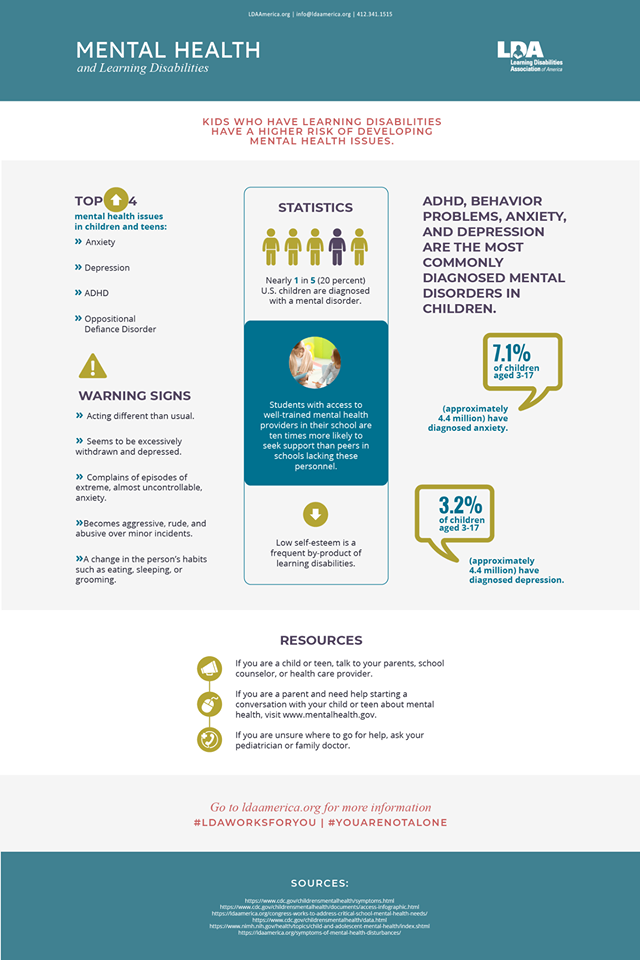Rachel Krueger, Chair of LDA’s Mental Health Committee, wears many hats as a volunteer for LDA including Co-Chair for the National Conference Committee, Chair of the LDA Council of State Leaders Committee, member of the LDA National Board, President of LDA Texas, and, most recently, a panelist for LDA’s Angst event. In this segment of LDA Today, Rachel shares some ways you can advocate for individuals with anxiety as we head back-to-school.
Q: As schools around the country have been preparing for this return to school season, August has been a focus on Mental Health Resources from LDA. Why is this an important issue to highlight for our LDA community?
A: More than half of kids with learning disabilities have a comorbid condition such as anxiety. For example, kids with anxiety don’t look like they have an issue, so it can be harder to understand what’s “typical adolescence” or an underlying mental health concern. These kids don’t always reach out for help, and they don’t always feel comfortable reaching out to their peers. Another example is when they are nervous about going back to school after a day of absence, and what heavily weighs on their mind might be, “what are people going to think?”. “Are they going to ask me why I was absent?” They are frequently worried about how to respond if they are asked too many questions or overloaded with thoughts about situations they may not be prepared for.
Learn more: “Mental Health and Learning Disabilities: Why a Higher Risk?”

Q: Last week, LDA hosted a viewing of the film Angst along with a panel discussion. Tell us a little about why LDA chose this film.
A: LDA chose Angst because anxiety is an important topic, and mental health issues are not addressed as much as they should be in school settings. It’s a powerful film, and it’s real. It’s organic and raw. It really presents what kids with anxiety are going through in school. It was hard for me to watch the film because I was very emotional. I felt empathy for the kids that were featured and was proud they had the strength to share their stories. The movie gives a small glimpse of what kids with anxiety go through every day.
Learn more: watch the recording of LDA’s Angst panel discussion
Q: This segment of LDA Today is a focus on advocacy. What tips or resources would you offer for advocating for individuals with anxiety? Let’s start with tips for parents.
Make sure your child has a “person” at school. Their person is like a comfort zone for them to go to when they feel conflicted or overwhelmed. Going to their person is like going to their safe place. My daughter had a small card that she held up when she was in class and needed to step away to gather her thoughts. Her teacher knew that she needed a break, where she would be, and that she would be back after regrouping. Having that card meant my daughter could take mental breaks when she needed them, and it gave her comfort knowing no questions would be asked about why she needed to leave the classroom.
Ensure that IEP and/or 504 accommodations are current and ask to review them if needed.
Learn more: Classroom Accommodations for Children with Anxiety
Q. Any suggestions for tips or resources for teachers as they work with individuals with anxiety?
You never know when a child in your class has a mental health issue. Assume they all do. Some tips that helped my daughter:
- Don’t call them up to the board to present. One accommodation to help complete these assignments is 1:1 with teachers. One goal is that the student will grow to self-advocate and to ask for these types of appointments on their own.
- Read the IEPs for your students. Know what types of accommodations they have and what kinds of progress they have or have not made previously.
- Give your students time to connect with you either in the morning, after school, or during lunch. Most kids with anxiety have difficulty working up the nerve to talk to their teacher, so having office hours is essential for them to feel like they can speak to you privately.
- Communicate with parents/caregivers. As worried as the student might be, some parents/caregivers are just as worried! If there is something about the student that you have a question about, reach out and ask because the more you know about them, the better your relationship with that child will be.
Learn more: Supporting Children with Anxiety in the Classroom
Q: How about advocacy tips or resources for individuals, including teachers, who are living with anxiety this back-to-school season?
- Know yourself and learn about what works and doesn’t work for you. This school year is filled with unknowns, so this year has only heightened mental health issues for people with anxiety. For some students, working online helps them minimize their concerns, making learning more stressful for others.
- Ensure that IEP and/or 504 accommodations are current and ask to review them if needed. If you have a new student, read any documentation regarding the child to ensure you both have a successful school year.
- Communicate, communicate, communicate. Parents, students, teachers, service providers, etc., all need to keep communication lines open and welcoming as everyone adjusts to a new school year and any changes along the way.
Learn more: Common Questions about Anxiety
For a positive school year, not only for students but for parents and educators, always remember that you are not alone! LDA is here with you. Our mental health committee will keep working to provide resources for you on our website through social media, webinars, and sessions at our conferences. #breakthestigma #talkaboutit #LDAworksforyou
About our Q&A Guest:

Rachel Krueger is the mother of three children, one of which has Learning Disabilities. She is a former preschool teacher and has training in Autism Spectrum Disorders, Cognitive Behavioral Therapy, and Pediatric Occupational Therapy. Rachel is also a member of the National Alliance on Mental Illness and is a certified Mental Health Advocate, and a Board Certified Special Education Advocate. She has worked with children who have bipolar issues, are on the Autism Spectrum and have Oppositional Defiance Disorders. She is on the LDA Board of Directors, Chair for the Council of State Leaders, Co-Chair of the Mental Health Committee, Assistant Chair for the 58th International Conference, and is on the Parent Advocacy Committee, all with the Learning Disabilities Association of America.
Rachel is passionate about educating parents about learning disabilities and how to have their child diagnosed at an earlier age. She is thankful for the LDA of America and is grateful to be part of such a wonderful organization.
Rachel lives in San Antonio, Texas, with her husband and three beautiful children.


